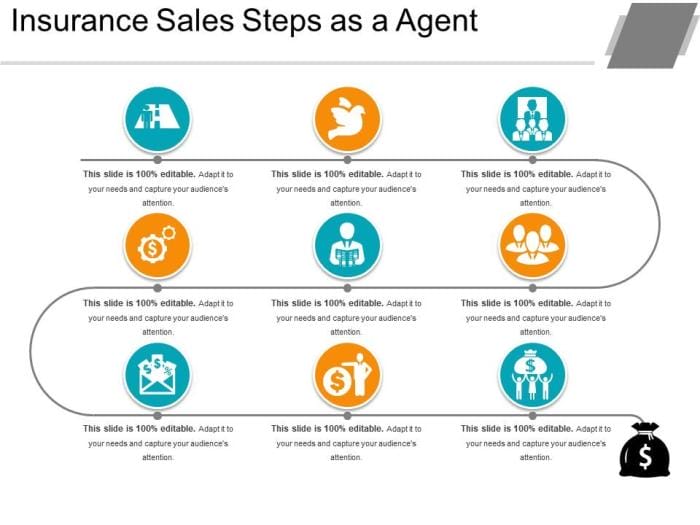In the competitive world of insurance sales, agents who possess the right skills and strategies can unlock remarkable success. This comprehensive guide delves into ten essential insurance sales tips that will elevate your performance, strengthen customer relationships, and drive exceptional results.
From building strong customer connections and understanding insurance products to identifying client needs and leveraging technology, this guide provides a roadmap for insurance agents to excel in their field. Whether you’re a seasoned professional or just starting out, these tips will empower you to navigate the insurance landscape with confidence and achieve outstanding outcomes.
Building Strong Customer Relationships

Fostering trust and loyalty is the cornerstone of successful insurance sales. Establishing personal connections with clients enables you to understand their unique needs and concerns, providing tailored solutions that align with their goals. This proactive approach cultivates lasting relationships, increasing client retention and boosting your reputation as a reliable and trustworthy advisor.
Actively Listening to Clients’ Needs and Concerns
Active listening is a crucial skill for insurance agents. By genuinely listening to your clients, you demonstrate empathy and understanding, creating a positive and trusting environment. This attentiveness allows you to grasp their specific requirements, fears, and aspirations, enabling you to offer customized recommendations that address their unique circumstances.
- Ask open-ended questions: Encourage clients to elaborate on their concerns and goals by posing open-ended questions that cannot be answered with a simple “yes” or “no.”
- Maintain eye contact and lean in: Nonverbal cues, such as maintaining eye contact and leaning in, convey your genuine interest and engagement.
- Avoid distractions: Eliminate distractions and interruptions to demonstrate your undivided attention to the client.
- Paraphrase and summarize: Periodically paraphrase and summarize the client’s concerns to ensure you accurately understand their needs.
Maintaining Ongoing Communication and Building Rapport
Maintaining ongoing communication with clients is vital for building rapport and solidifying relationships. Regular interactions foster trust and demonstrate your commitment to their well-being. Proactively reaching out to clients to check on their satisfaction, provide updates on their policies, or offer advice on risk management strategies reinforces your role as a trusted advisor.
- Schedule regular check-ins: Schedule periodic check-ins, whether via phone calls, emails, or in-person meetings, to stay connected with clients.
- Respond promptly to inquiries: Ensure prompt responses to client inquiries, demonstrating your dedication to their needs.
- Personalize communications: Tailor your communications to each client’s preferences and circumstances, adding a personal touch that strengthens the relationship.
- Provide value-added services: Offer value-added services, such as financial planning advice or home security tips, to demonstrate your expertise and commitment to their overall well-being.
Understanding Insurance Products
Profound knowledge of insurance products is essential for an insurance agent’s success. This knowledge empowers agents to offer expert guidance to clients, tailor insurance solutions to specific needs, and build trust.
Staying Updated with Insurance Offerings and Industry Trends
To remain knowledgeable about insurance products, agents must continuously update themselves. This includes:
- Regularly reviewing product brochures and updates: Insurance companies often introduce new products or modify existing ones. Staying updated with these changes ensures agents are familiar with the latest offerings.
- Attending industry conferences and workshops: These events provide opportunities to learn about new products, industry trends, and best practices.
- Networking with peers and industry experts: Engaging with other agents, underwriters, and insurance professionals can provide valuable insights into new products and industry developments.
- Subscribing to industry publications and newsletters: These resources offer up-to-date information on insurance products, regulatory changes, and market trends.
Explaining Complex Insurance Concepts to Clients
Insurance products can be complex and challenging to understand for many clients. An insurance agent’s ability to explain these concepts in a clear and concise manner is crucial for building trust and ensuring clients make informed decisions.
- Use simple language: Avoid jargon and technical terms that may confuse clients. Use straightforward language that clients can easily understand.
- Provide clear examples: Illustrate insurance concepts with real-life examples that clients can relate to. This helps them grasp the practical implications of different insurance policies.
- Tailor explanations to individual needs: Each client has unique insurance needs and understanding levels. Tailor your explanations to match the client’s knowledge and interests.
- Be patient and answer questions: Clients may have questions or concerns about insurance products. Be patient and answer their questions thoroughly. Encourage them to ask questions until they fully understand the concepts.
Identifying Client Needs

Uncovering clients’ unique insurance requirements is crucial for tailoring effective insurance recommendations. This process involves conducting a thorough needs assessment, actively listening to clients’ concerns, and prioritizing their financial goals.
Asking Probing Questions
Effective communication is key to understanding clients’ needs. Engage in open-ended conversations, asking probing questions to uncover their concerns, aspirations, and financial goals. Encourage clients to elaborate on their responses, ensuring a comprehensive understanding of their situation.
- Explore clients’ current insurance coverage, identifying gaps and areas for improvement.
- Inquire about their family structure, dependents, and future life events that may impact their insurance needs.
- Discuss clients’ financial goals, including retirement planning, education funding, and wealth accumulation.
- Understand clients’ risk tolerance and appetite for investment, considering their comfort level with market fluctuations.
Prioritizing Client Needs
Once clients’ needs are identified, prioritize them based on urgency, importance, and financial impact. This ensures that the most critical needs are addressed first, while also considering clients’ long-term financial objectives.
- Evaluate the potential financial consequences of each need, considering the impact on clients’ current and future financial stability.
- Assess the urgency of each need, considering the timeline for addressing it and the potential risks associated with delay.
- Consider clients’ personal preferences and values, ensuring that the recommended insurance solutions align with their goals and priorities.
Effective Sales Techniques

Mastering effective sales techniques is crucial for insurance agents to consistently achieve their sales goals and build long-lasting customer relationships. This comprehensive guide covers the entire sales process, from establishing initial contact to closing the deal, and provides strategies for handling objections and ensuring post-sale satisfaction.
Initial Contact and Building Rapport
The initial contact with a potential client sets the tone for the entire sales process. A warm and professional approach, coupled with active listening and empathy, can make a significant difference in building rapport and trust. Insurance agents should aim to understand the client’s needs, concerns, and aspirations to tailor their sales pitch accordingly.
- Personalize the conversation by addressing the client by name and showing genuine interest in their situation.
- Demonstrate empathy by understanding their concerns and showing that you genuinely care about their well-being.
- Actively listen to their needs, wants, and aspirations to tailor your sales pitch accordingly.
Product Knowledge and Tailored Solutions
In-depth knowledge of insurance products and services is essential for effective sales. Insurance agents should be able to explain the benefits, coverage options, and limitations of various policies to help clients make informed decisions. Additionally, tailoring solutions to meet specific client needs demonstrates a commitment to providing personalized service and building trust.
- Stay updated on the latest insurance products and services to offer clients the most comprehensive coverage options.
- Clearly explain the benefits, coverage options, and limitations of each policy to help clients understand their choices.
- Tailor solutions to meet specific client needs and demonstrate a commitment to personalized service.
Handling Objections and Sales Resistance
Objections and sales resistance are common during the sales process. Insurance agents should be prepared to address these concerns professionally and effectively. This involves acknowledging the client’s objections, understanding their underlying concerns, and providing well-reasoned responses that address their specific issues.
Overcoming sales resistance requires patience, empathy, and the ability to adapt your sales pitch based on the client’s feedback.
- Acknowledge the client’s objections and show empathy for their concerns.
- Understand the underlying reasons behind their objections to address them effectively.
- Provide well-reasoned responses that address the client’s specific issues.
- Adapt your sales pitch based on the client’s feedback to overcome sales resistance.
Closing the Deal and Following Up
Closing the deal is the ultimate goal of the sales process. Insurance agents should aim to create a sense of urgency and provide a clear call to action to encourage clients to make a decision. Following up after the sale is crucial to ensure client satisfaction and build long-term relationships.
This involves checking in with clients to ensure they are satisfied with their coverage, addressing any concerns they may have, and providing ongoing support.
- Create a sense of urgency by highlighting the benefits of taking action now.
- Provide a clear call to action to encourage clients to make a decision.
- Follow up after the sale to ensure client satisfaction and build long-term relationships.
- Check in with clients to ensure they are satisfied with their coverage and address any concerns they may have.
Time Management and Organization

Insurance agents, time management is essential for maximizing productivity and delivering exceptional customer service. By implementing effective strategies, you can optimize your schedule, prioritize tasks, and minimize distractions, allowing you to serve more clients and grow your business.
To achieve this, consider the following time management techniques:
Prioritize Tasks
Identify and prioritize your most important tasks using tools like the Eisenhower Matrix, which categorizes tasks into urgent and important, important but not urgent, urgent but not important, and not urgent and not important. Focus on high-priority tasks that contribute to your long-term goals.
Create a Schedule and Stick to It
Develop a daily or weekly schedule that Artikels your tasks, appointments, and deadlines. Allocate specific time slots for each activity, including breaks and time for unexpected events. Regularly review and adjust your schedule to ensure it remains realistic and achievable.
Avoid Distractions
Minimize distractions to maintain focus and productivity. Turn off notifications, find a quiet workspace, and set boundaries to limit interruptions. Consider using productivity apps or techniques like the Pomodoro Technique, which involves working for 25 minutes followed by a 5-minute break.
Utilize Technology and Automation
Leverage technology and automation tools to streamline administrative tasks and free up more time for client interaction. Explore customer relationship management (CRM) systems, scheduling software, and automation tools that can handle tasks like appointment reminders, policy renewals, and data entry.
Professional Development

In the ever-changing landscape of the insurance industry, continuous learning and professional development are crucial for insurance agents to stay ahead. Enhancing knowledge, skills, and expertise not only benefits agents but also positively impacts their clients and the overall reputation of the insurance profession.
Agents can pursue various avenues for professional development, including attending industry conferences, workshops, and seminars, obtaining professional certifications and designations, and engaging in ongoing education and training programs.
Attending Industry Conferences, Workshops, and Seminars
Participating in industry events offers numerous advantages for insurance agents. These events provide opportunities to:
- Stay updated on the latest industry trends, products, and regulations.
- Network with peers, industry experts, and potential clients.
- Learn from thought leaders and gain insights into best practices.
- Enhance knowledge and skills through interactive sessions and workshops.
Obtaining Professional Certifications and Designations
Earning professional certifications and designations demonstrates an agent’s commitment to excellence and expertise. These credentials can:
- Enhance credibility and professionalism in the eyes of clients and colleagues.
- Open doors to new career opportunities and advancement prospects.
- Provide a competitive edge in the insurance marketplace.
- Increase earning potential and command higher compensation.
Ongoing Education and Training Programs
Insurance agents should continuously engage in ongoing education and training programs to stay abreast of industry developments and improve their skills. This may include:
- Completing online courses and webinars.
- Attending in-person training sessions.
- Reading industry publications and journals.
- Participating in mentoring and coaching programs.
Ethical and Legal Considerations

In the realm of insurance sales, upholding ethical and legal standards is paramount. This entails acting with integrity, honesty, and fairness, adhering to regulations, and safeguarding the interests of clients.
Maintaining ethical standards in insurance sales is crucial for building trust, fostering positive relationships with clients, and ensuring a sustainable business. By adhering to ethical principles, insurance agents can uphold their professional reputation, attract and retain clients, and contribute to the overall well-being of the insurance industry.
Handling Conflicts of Interest
Conflicts of interest arise when an insurance agent’s personal or financial interests clash with their professional obligations towards clients. Handling such situations ethically requires transparency, disclosure, and prioritizing the client’s best interests.
- Declare Conflicts: Disclose any potential conflicts of interest to clients promptly and in writing. Seek their informed consent before proceeding.
- Avoid Self-Dealing: Refrain from engaging in transactions that benefit the agent at the expense of the client. Place the client’s interests above personal gain.
- Seek Independent Advice: Encourage clients to seek independent legal or financial advice if they have concerns about a potential conflict of interest.
Maintaining Confidentiality
Preserving client confidentiality is a cornerstone of ethical insurance sales practices. Agents must safeguard sensitive client information, including personal data, financial details, and health records.
- Secure Data: Implement robust data security measures to protect client information from unauthorized access, use, or disclosure.
- Limit Access: Restrict access to client data only to authorized personnel who require it for legitimate business purposes.
- Obtain Consent: Obtain clients’ consent before sharing their information with third parties, unless legally required.
Avoiding Misrepresentation
Misrepresentation occurs when an insurance agent provides false or misleading information to clients. This unethical practice undermines trust and can have serious consequences.
- Accurate Information: Provide clients with accurate and complete information about insurance policies, coverage terms, and benefits.
- Avoid Exaggeration: Refrain from exaggerating the benefits or downplaying the limitations of an insurance policy.
- Clarify Uncertainties: If there is uncertainty about a policy provision, clarify it with the client or seek guidance from the insurance company.
Consequences of Unethical or Illegal Sales Practices
Engaging in unethical or illegal sales practices can lead to severe consequences for insurance agents, including:
- Loss of License: Regulatory authorities may suspend or revoke the agent’s license to sell insurance.
- Legal Liability: Agents may face civil lawsuits or criminal charges, resulting in fines, restitution, or imprisonment.
- Damaged Reputation: Unethical practices can tarnish an agent’s reputation, leading to loss of clients and difficulty finding future employment.
Leveraging Technology

Integrating technology into insurance sales can greatly enhance productivity, efficiency, and customer service. It streamlines processes, improves communication, and provides valuable insights to drive sales.
Customer Relationship Management (CRM) Systems
CRM systems are powerful tools that help manage customer interactions, track sales performance, and provide personalized service. They enable insurance agents to:
- Store and organize customer data, including contact information, policies, claims history, and preferences.
- Manage sales pipelines, track leads, and monitor progress through the sales cycle.
- Automate tasks such as scheduling appointments, sending reminders, and generating reports.
- Provide real-time access to customer information, allowing agents to respond quickly to inquiries and provide tailored solutions.
Insurance Software
Specialized insurance software can help agents with various tasks, including:
- Calculating premiums, underwriting policies, and issuing certificates.
- Managing claims, processing payments, and tracking claim status.
- Generating reports and analytics to identify trends, evaluate performance, and make data-driven decisions.
- Providing real-time quotes and policy comparisons, enabling agents to offer competitive options to clients.
Mobile Apps
Mobile apps can extend the reach of insurance agents and provide convenient access to customers. They can be used to:
- Access customer information, policies, and claims history on the go.
- Generate quotes, issue policies, and collect payments securely.
- Schedule appointments, send reminders, and communicate with clients in real-time.
- Provide self-service options, allowing customers to manage their policies, file claims, and make payments online.
By leveraging technology effectively, insurance agents can improve their productivity, efficiency, and customer service, leading to increased sales and stronger client relationships.
Performance Evaluation and Improvement
In the dynamic insurance industry, monitoring and enhancing sales performance is crucial for long-term success. It enables insurance agents to identify strengths, address weaknesses, and refine their sales strategies to achieve optimal results.
Implementing a robust performance evaluation system is the cornerstone of effective sales improvement. This system should include:
Tracking Sales Performance
- Data Collection: Gather relevant data points, including sales volume, revenue generated, number of policies sold, and customer satisfaction ratings.
- Performance Metrics: Define key performance indicators (KPIs) that align with the company’s goals and objectives. Common metrics include sales growth, market share, and customer retention.
- Regular Monitoring: Establish a consistent schedule for tracking and reviewing sales performance. This allows for timely identification of trends and patterns.
Setting Realistic Sales Goals
Setting realistic and achievable sales goals is essential for motivating and guiding insurance agents. These goals should be:
- Specific: Clearly defined and measurable, leaving no room for ambiguity.
- Challenging: Ambitious yet attainable, pushing agents to strive for excellence.
- Time-bound: Have a specific timeframe for achievement, creating a sense of urgency.
Monitoring Progress
Regularly monitoring progress towards sales goals is crucial for staying on track and making necessary adjustments. This involves:
- Tracking Performance: Continuously monitor key performance indicators to assess progress and identify areas for improvement.
- Performance Reviews: Conduct regular performance reviews with agents to discuss their progress, provide feedback, and offer support.
- Adjusting Strategies: If progress is not satisfactory, work with agents to adjust their sales strategies and tactics to align with changing market conditions or customer needs.
Continuous Improvement
In the ever-evolving insurance industry, continuous improvement is essential for staying competitive and meeting customer expectations. This involves:
- Seeking Feedback: Actively seek feedback from customers, colleagues, and superiors to identify areas for improvement.
- Training and Development: Invest in ongoing training and development programs to enhance agents’ knowledge, skills, and abilities.
- Adapting to Change: Embrace change and adapt sales strategies to align with evolving market trends, customer preferences, and regulatory requirements.
Summary

By implementing these proven insurance sales tips, you’ll not only boost your sales numbers but also cultivate enduring customer relationships built on trust and loyalty. Remember, insurance is not just about selling policies; it’s about providing peace of mind and financial security to your clients.
Embrace these strategies, stay committed to continuous learning, and watch your insurance sales career soar to new heights.
Answers to Common Questions
What is the most crucial aspect of insurance sales?
Building strong customer relationships is paramount. By establishing trust and rapport, you create a foundation for long-term success and referrals.
How can I stay updated with the latest insurance products and industry trends?
Attend industry conferences, workshops, and seminars. Stay informed through trade publications, webinars, and online resources.
What is the best way to handle objections and overcome sales resistance?
Listen actively, understand the client’s concerns, and provide tailored solutions. Address objections with empathy and offer alternatives that align with their needs.
How can I leverage technology to enhance my insurance sales?
Utilize customer relationship management (CRM) systems, insurance software, and mobile apps to streamline tasks, improve efficiency, and provide exceptional customer service.
What is the key to continuous improvement in insurance sales?
Continuously seek feedback from clients and colleagues. Evaluate your sales performance, set realistic goals, and adapt your strategies based on market trends and client needs.



